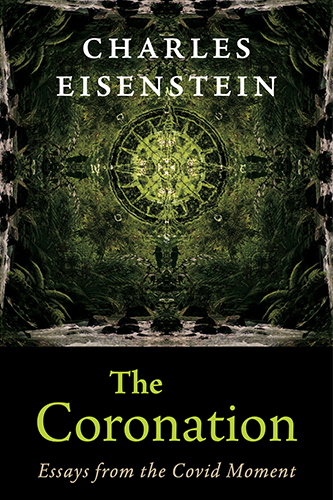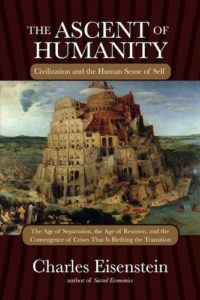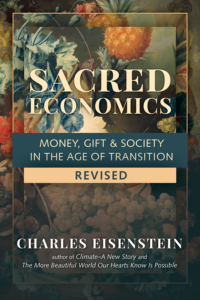The More Beautiful World Our Hearts Know Is Possible
Chapters
Chapter 18: Scarcity
The hardest thing of all is to find a black cat in a dark room, especially if there is no cat.
―Confucius
Even as the old world comes apart around us, or even as we leave it in disgust, still we carry its conditioning. We have been colonized through and through by the old Story of the World. We are born into its logic, acculturated to its worldview, and imbued with its habits. And all of this is so pervasive as to be nearly invisible. As the comment of the Dogon elder suggests, we take for granted the very things that are at the root of the crisis, helplessly replicating them in all we do.
Wisdom traditions, indigenous worldviews, and sacred stories help to illuminate some of this baggage we carry from the Age of Separation, just like the Dogon elder questioned the operating assumption of scarcity of time. As we become more attuned to a new way of seeing the world, the more we wish to rid ourselves of the burdensome habits of the old. Not only do they no longer resonate with who we are and who we are becoming, but we recognize that trapped by those habits, we cannot help but create the world in their image. To release the habits of separation is therefore more than an issue of self-cultivation; it is also crucial to our effectiveness as activists, healers, and changemakers.
As I will describe, changing these habits of seeing, thinking, and doing is no trivial matter. First, they must be made visible. Second, we must attempt the change in a way that is not itself among those habits—and so many of the ways we conceive and enact change draw from paradigms of conquest, judgment, and force. Third, we must deal with an environment that enforces the old habits, not only through economic and social means, but through a relentless barrage of subtle messaging that takes for granted the very things we are seeking to change.
The debate over debt reduction versus fiscal stimulus takes for granted economic growth as an unquestionable good. The question of immigration reform takes for granted the social conventions of borders and ID. Statistics on Third World poverty take for granted that money is a good measure of wealth. The choice of news stories on television implies that these are the most important, relevant things happening. Signs all over public space saying things like “Emergency brake. Penalty for misuse” imply that it is penalties that maintain social order, just as ubiquitous security cameras imply that people need to be watched. Above all, the normalcy of society’s routines tells us that this way of life is normal.
For many people, the most powerful enforcer of the habits of separation is money. Usually, the actions that love inspires don’t redound to our financial self-interest; to the contrary, it is money that often seems to thwart such actions. Is it prudent? Is it practical? Can you afford to? For other people the enforcer is a religious teaching, or social pressure, or the fear of family and friends. “It won’t do any good.” “It isn’t safe.” “It’s weird.”
You have probably experienced the old story’s power to draw you back in. You have a transcendent experience of unity, flow, connection, compassion, or the miraculous, and see with total clarity how you will henceforward live in a different way. It could be the kind of experience people describe as spiritual, or maybe as mundane as fully realizing the impact of high-carbon lifestyles on the planet. It could be an inspirational book or seminar, a training in nonviolent communication, a course on yogic philosophy. In the days and weeks following the experience, you live effortlessly according to what you realized. Maybe you see everyone around you as an emanation of the divine. But after a while, what had been clear and effortless starts to require an effort to remind yourself, to recall the experience. You need discipline where you needed none before. You have to make a practice of seeing the divine in all, whereas it had been obvious and effortless. Or you start driving your car more again, making compromises. Life goes back to normal.
What is happening here is that usually, people cannot hold a new story by themselves. A story can be held only in community, which is why people seek to establish communities dedicated to spiritual ideas, sheltered from the corrosive influences of the dominant Story of the World. To some extent, we can do the same by surrounding ourselves with people who are living similar values.
No matter how strong it is, no external social or economic pressure would be able to keep us in the old story if it did not operate on something internal. More than anything external, it is our own habits that draw us back into the old story after we have glimpsed a new one. These habits run so deep that we are rarely aware of them; when we are, we usually assume them to be human nature. Many of them fall into one of three categories: habits of scarcity, habits of judgment, and habits of struggle. The next few chapters will elucidate some of these habits, their originating cultural and personal state of being, and the new habits of interbeing that can supplant them.
You will notice that many of the habits of separation are familiar. Injunctions against them abound in mainstream religious teachings as well as popular morality. That is because religion and culture both carry seeds of reunion. But we find these teachings hard to live up to because they are inconsistent with the dominant myths and structures of civilization. Thus they become rules: prohibitions, prescriptions, etc., and therefore agents of a prime habit of separation, which is to conquer the self. This is impossible to avoid. Immersed in a story that defines one as a discrete, separate individual in a world of other, surrounded by institutions like money that enact and enforce that story, teachings like the Golden Rule seem indeed to run counter to natural human behavior. For the separate self, selfishness seems to run counter to service.
No wonder, trying to reconcile the rules with the world we have lived in, religious authorities divided the universe into two realms, the earthly and the heavenly, the material and the spiritual. Yes, they conceded, the material world is sinful, and our bodies, being of that world, are sinful as well, but there is something else, another world with different rules. To live according to those, we have to resist the ways of the material world and the flesh.
Please notice any tendency you may have to apply the program of self-conquest to the habits of separation that I will describe. There is a different way.
Scarcity is one of the defining features of modern life. Around the world, one in five children suffer from hunger. We fight wars over scarce resources such as oil. We have depleted the oceans of fish and the ground of clean water. Worldwide, people and governments are cutting back, making do with less, because of a scarcity of money. Few would deny that we live in an era of scarce resources; many would say it is dangerous to imagine otherwise.
On the other hand, it is not hard to see that most of this scarcity is artificial. Consider food scarcity: vast amounts, as much as 50 percent of production by some estimates, is wasted in the developed world. Vast areas of land are devoted to producing ethanol, vaster areas still are devoted to America’s number one cultivated species: lawn grass. Meanwhile, land that is devoted to food production is typically farmed by chemical-intensive, machine-dependent methods that are actually less productive (per hectare, not per unit of labor) than labor-intensive organic agriculture and permaculture.
Similarly, scarcity of natural resources is also an artifact of our system. Not only are our production methods wasteful, but much of what is produced does little to further human well-being. Technologies of conservation, recycling, and renewables languish undeveloped. Without any real sacrifice, we could live in a world of abundance.
Perhaps nowhere is the artificiality of scarcity so obvious as it is with money. As the example of food illustrates, most of the material want in this world is due to lack not of anything tangible, but to lack of money. Ironically, money is the one thing we can produce in unlimited quantities: it is mere bits in computers. Yet we create it in a way that renders it inherently scarce, and that drives a tendency toward concentration of wealth, which means overabundance for some and scarcity for the rest.
Even wealth offers no escape from the perception of scarcity. A 2011 study of the superwealthy at Boston College’s Center on Wealth and Philanthropy surveyed attitudes toward wealth among households with net worth of $25 million or more (some much more—the average was $78 million). Amazingly, when asked whether they experienced financial security, most of the respondents said no. How much would it take to achieve financial security? They named figures, on average, 25 percent higher than their current assets.
If someone with $78 million in assets can experience scarcity, it obviously has much deeper roots than economic inequality. The roots are nowhere else than in our Story of the World. Scarcity starts in our very ontology, our self-conception, and our cosmology. From there, it infiltrates our social institutions, systems, and experience of life. A culture of scarcity immerses us so completely that we mistake it for reality.
The most pervasive, life-consuming form of scarcity is that of time. As the Dogon man exemplifies, “primitive” people generally don’t experience a shortage of time. They don’t see their days, hours, or minutes as numbered. They don’t even have a concept of hours or minutes. “Theirs,” says Helena Norberg-Hodge in describing rural Ladakh, “is a timeless world.” I have read accounts of Bedouins content to do nothing but watch the sands of time pass, of Pirahã fully absorbed in watching a boat appear on the horizon and disappear hours later, of native people content to literally sit and watch the grass grow. This is a kind of wealth nearly unknown to us.
Scarcity of time is built in to the Story of Science that seeks to measure all things, and thereby renders all things finite. It delimits our existence to the boundaries of a single biographical timeline, the finite span of a separate self.
Scarcity of time also draws from the scarcity of money. In a world of competition, at any moment you could be doing more to get ahead. At any moment you have a choice whether to use your time productively. Our money system embodies the maxim of the separate self: more for you is less for me. In a world of material scarcity, you can never “afford” to rest at ease. This is more than a mere belief or perception: money as it exists today is not, as some teachings claim, “just energy”; at least it is not a neutral energy. It is always in short supply. When money is created as interest-bearing debt as ours is, then always and necessarily there will be more debt than there is money. Our systems mirror our collective perceptions.
“More for you is less for me” is a defining axiom of Separation. True in a competitive money economy, it is false in earlier gift cultures in which, because of widespread sharing, more for you was more for me. Scarcity conditioning extends far beyond the economic realm, manifesting as envy, jealousy, one-upmanship, social competitiveness, and more.
The scarcity of money, in turn, draws from the scarcity of love, intimacy, and connection. The foundational axiom of economics says as much: human beings are motivated to maximize rational self-interest. This axiom is a statement of separateness and, I hazard to say, loneliness. Everyone out there is a utility-maximizer, in it for themselves. You are alone. Why does this seem so true, at least to economists? Where does the perception and experience of aloneness come from? In part it comes from the money economy itself, which surrounds us with standardized, impersonal commodities divorced from their original matrix of relationships, and replaces communities of people doing things for themselves and each other with paid professional services. As I describe in Sacred Economics, community is woven from gifts. Gifts in various forms create bonds, because a gift creates gratitude: the desire to give in return or to give forward. A money transaction, in contrast, is over and done with once goods and cash have changed hands. Each party goes their separate ways.
The scarcity of love, intimacy, and connection is also inherent in our cosmology, which sees the universe as composed of generic building blocks that are just things, devoid of sentience, purpose, or intelligence. It is also a result of patriarchy and its attendant possessiveness and jealousy. If one thing is abundant in the human world, it should be love and intimacy, whether sexual or otherwise. There are so many of us! Here like nowhere else is the artificiality of scarcity plain. We could be living in paradise.
Sometimes I lead a workshop activity that involves prolonged mutual gazing between two people. After the initial discomfort fades and the minutes go by, most people experience an ineffably sweet intimacy, a connection that penetrates through all the superficial posing and pretense that define daily interactions. These pretenses are much flimsier than we would like to think—they cannot withstand more than half a minute of real seeing, which is probably why it is rude to gaze into someone’s eyes for more than a couple seconds. That is all the intimacy we typically allow ourselves. That is all the wealth we can handle right now. Sometimes, after the activity, I will observe to the group, “Can you imagine—all that bliss is available all the time, less than sixty seconds away, yet we go for years and years without it. Experiencing it every day, would people still want to shop? Drink? Gamble? Kill?”
How close is the more beautiful world our hearts know is possible? It is closer than close.
What need, beyond basic survival needs, is more important to a human being than to be touched, held, groomed, seen, heard, and loved? What things do we consume in futile compensation for the unfulfillment of these needs? How much money, how much power, how much control over other people does it take to meet the need for connection? How much is enough? As the above-mentioned Boston College study implies, no amount is enough. Remember that the next time you think greed is the culprit behind Gaia’s woes.
I could go on to mention many other kinds of scarcity that are so normal in our society as to escape notice. Scarcity of attention. Scarcity of play. Scarcity of listening. Scarcity of dark and quiet. Scarcity of beauty. I live in a hundred-year-old house. What a contrast there is between the regular, factory-perfect commodity objects and buildings that environ us, and the old radiators in my house, clanking and hissing all night, with their curved iron, their irregular valves and connectors, made with a touch more care than they needed to be, that seem to possess a quality of life. I drive past the strip malls and big box stores, the parking lots and auto dealerships, office buildings and subdevelopments, each building a model of cost-efficiency, and I marvel, “After five thousand years of architectural development, we’ve ended up with this?” Here we see the physical expression of the ideology of science: Only the measurable is real. We have maximized our production of the measurable—the square feet, the productivity per labor unit—at the expense of everything qualitative: sacredness, intimacy, love, beauty, and play.
How much of the ugly does it take to substitute for a lack of the beautiful? How many adventure films does it take to compensate for a lack of adventure? How many superhero movies must one watch, to compensate for the atrophied expression of one’s greatness? How much pornography to meet the need for intimacy? How much entertainment to substitute for missing play? It takes an infinite amount. That’s good news for economic growth, but bad news for the planet. Fortunately, our planet isn’t allowing much more of it, nor is our ravaged social fabric. We are almost through with the age of artificial scarcity, if only we can release the habits that hold us there.
From our immersion in scarcity arise the habits of scarcity. From the scarcity of time arises the habit of hurrying. From the scarcity of money comes the habit of greed. From the scarcity of attention comes the habit of showing off. From the scarcity of meaningful labor comes the habit of laziness. From the scarcity of unconditional acceptance comes the habit of manipulation. These are but examples—there are as many responses to each of these missing things as there are individuals.
Endnotes:
15. See Chapter 2 of Sacred Economics and my article “Permaculture and the Myth of Scarcity” for a more thorough discussion with references.






